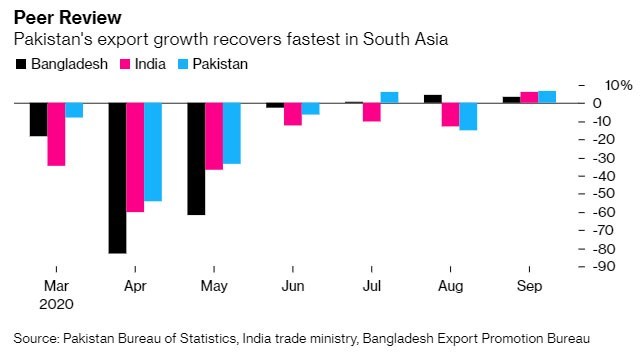ISLAMABAD: Pakistan’s decision to loosen pandemic restrictions early has helped the country’s exports emerge stronger than its South Asian peers, Bloomberg reported on Saturday.
According to a report by Bloomberg, outbound shipments have grown at a faster pace than Bangladesh and India as textiles, which account for half of the total export, led the recovery.
The country saw total shipments grow 7 per cent in September, compared with New Delhi’s 6pc and Dhaka’s 3.5pc.
The report stated that Prime Minister (PM) Imran Khan’s administration was the first in the region to ease pandemic restrictions, allowing export units to reopen in April, a month after locking them down to stem the spread of Covid-19. This helped draw companies from the South Asian nation.
“Pakistan has seen orders shifting from multiple nations including China, India and Bangladesh,” the report quoted All Pakistan Textile Mills Association (APTMA) Secretary General Shahid Sattar as having said. “Garment manufacturers are operating near-maximum capacity and many can’t take any orders for the next six months.”
Even as lockdown curbs disrupted trade in India and Bangladesh for at least two months beginning late March, Pakistan was already making face masks and personal protective gear for export.
The South Asian nation also gained some orders from companies looking to diversify their supply chains amid the trade war between the U.S. and China, the world’s top textile exporter, despite factories there reopening as early as April.
“This war between two giants has given us new opportunities in polyester-cotton products,” the report quoted the nation’s largest textile maker, Nishat Mill’s Garment and Home Textile Operations Head Khalid Mehmood having said. “So there is a six-month slot for Pakistan now to capture the maximum number of customers who were China-based.”
Executives from Nishat Mills and Interloop Ltd, one of the world’s largest manufacturers of socks that counts Nike Inc. and Adidas AG among its clients, said they have seen some orders diverted to them from China.
Meanwhile, Gadoon Textile Mills Ltd. received orders redirected from Bangladesh, the world’s second-largest apparel exporter, and India, the third-largest textile exporter.
“The orders we were exporting to Europe and the US have not recovered,” Gadoon Chief Financial Officer (CFO) Muhammad Imran Moten said during an analyst briefing. “But the diversion of orders from China and Bangladesh is the compensating factor.”




